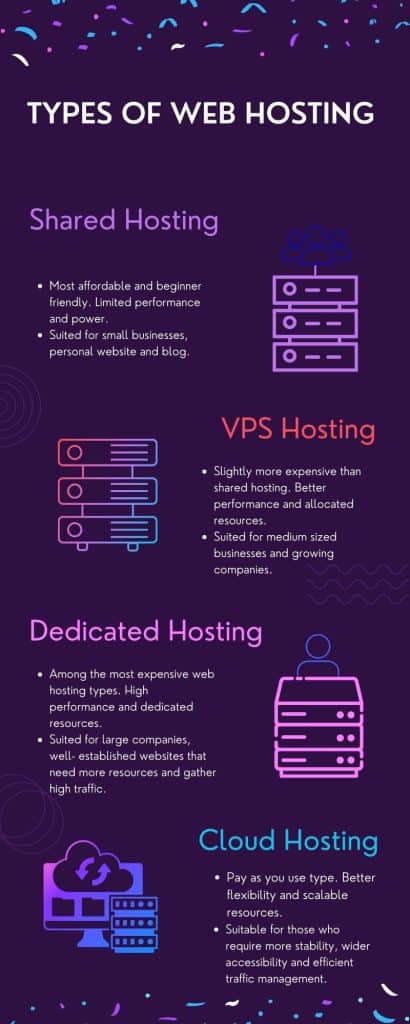Do you have a website? If you do, then you’re not the only one. The number of website owners is growing every day at a staggering rate. Websites are the most efficient way to increase your brand awareness, share your ideas, or simply communicate with the world. The time spent on the internet has only increased in recent years. It is estimated that around 63% of the population is now connected to the internet.
This means that websites have become more important than ever to ensure the success of your business. To reach your business goals with the help of your website, the first question you need to ask yourself is “Which type of web hosting should I choose?” and the answer lies here in this article. Here, we discuss the types of web hosting plans available and which web hosting type best suits your website.
How to Choose the Right Web Hosting type for your website – An Overview

What is Web Hosting?
Before getting into what type of web hosting is best for you, let’s get a clear understanding of what is meant by web hosting in general. To put it simply, web hosting is a service that lets you store your website on the internet and make it accessible.
All your content, database, and essential information is stored on a server and made accessible globally for internet users. Your website’s address redirects the user to this space on the server and fetches all the information to make it visible to the user.
Types of Web Hosting
Your website is hosted on servers. Your hosting plan and type would depend on the type of server you choose. There mainly types of web hosting plans:
- Shared Hosting
- VPS (Virtual Private Server) Hosting
- Dedicated Hosting
- Cloud Hosting
While the entire hosting server gives a storage center for your web contents, these hosting options vary in the amount of storage capacity, technical expertise requirement, server speed, reliability, control, and security options. Each hosting type has its own pros and cons.
Let’s compare each one by one.
1. Shared Hosting
In a Shared Hosting environment, you host your website on a server that is hosting multiple other websites as well. It is one of the cheapest and most popular hosting options.
You will be sharing your resources such as CPU, memory, and disk space with the other websites hosted on the server. Shared hosting is great for beginners who are just starting to get a hang of web hosting and want to try it out.
Pros:
- It is Affordable
- It’s beginner friendly and simple to get started with
- Security, upgrades, and maintenance of the server are handled for you.
Cons:
- It can be slow when it comes to speed and process as the resources will be shared with other sites also
- There is no guarantee of security
- It is difficult to scale as it has limited storage and bandwidth capacity
2. Virtual Private Server (VPS)
VPS is quite similar to shared hosting. You share the server with other website owners but the number of users is much less. Also, resources such as CPU and memory are allocated individually to all users, meaning you do not have to share all your resources with users. Only the server is shared.
Basically, there are fewer sites sharing the space and resources and the server is partitioned into various virtualized server environments. It provides higher power and flexibility than being on a shared account.
Pros:
- More affordable than the dedicated server
- More secure than shared hosting
- It is faster in performance
- It’s scalable
Cons:
- More expensive than shared hosting
- It might be difficult to configure the server for a non-technical person
- Limited options compared to dedicated hosting
3. Dedicated Hosting
Dedicated hosting is exactly as it sounds like! Your website is stored on a single physical server that is completely dedicated to you. Resources are not shared with anyone; you will have complete access to the server and allocated resources.
You can also configure and set up the hosting environment to the exact specifications you want. Dedicated hosting is fully customizable. This type of Hosting is generally costly, but in return, you can get very high performance and higher security compared to all the other web hosting options.
Pros:
- The dedicated resources will be allocated to only you (single user)
- It is faster in performance
- You can configure the server according to your specific requirement
- It is secure as the space is not shared
- Full control over the server
Cons:
- It is more costly
- Require technical expertise
4. Cloud Hosting
Cloud hosting is a completely different type of web hosting. It is based on the advanced concept of cloud computing technology which offers unlimited control for handling traffic or spikes in traffic. Instead of a website being stored on a single server, it will be hosted on a virtual partitioned server. It draws resources from a network of servers.
This means that multiple servers work together to handle the traffic or spikes for a single website. Of course, you share the resources with others, similar to Virtual Private Server (VPS) but because there are more highly configured servers involved, there are more resources available to everyone.
Cloud Hosting is very reliable as it draws its resources from multiple different servers meaning, in case one server goes down; the other servers bridge the gap. Also, Cloud Hosting is very scalable and flexible, so in case you require more resources you can easily configure it by adding more.
Pros:
- It is more reliable compared to other hosting
- It is very scalable and flexible
- Cost-effective i.e. pay only for what you use
Cons:
- Needs more advanced technical knowledge
- Potentially insecure as you are sharing resources with other websites
Which type of Web Hosting is best for your website?
If you are a beginner or if you need limited resources then opting for shared hosting is best for you. For example, if you are planning to start a personal website or a blog then a shared hosting plan is good. This is because you do not have to spend a lot of money on hosting and the resources available will be sufficient for you.
VPS hosting is best if you have a higher budget and higher traffic. The resources need to regulate traffic and maintain your website with its scalability feature. It is also more secure than shared hosting. If you have a growing website, then go for VPS hosting as it is capable of better performance than shared hosting and is much more affordable than dedicated hosting.
If you have a well-established business website, then a dedicated hosting plan is great for you. This is because you will have your own dedicated server where you do not have to share your space with any other user. You can easily handle increasing traffic, have better security, and have smooth performance.
For choosing the web hosting plan for your website, look at the resources you need, your budget, scalability options, and also customer support offered by the providers. We at Veeble, have been serving more than 800,000 web experts for more than 10 years with different hosting services administrations and associated items to 130+ Countries, we have become one of the fastest-growing web hosting and domain providers. Try us out!
